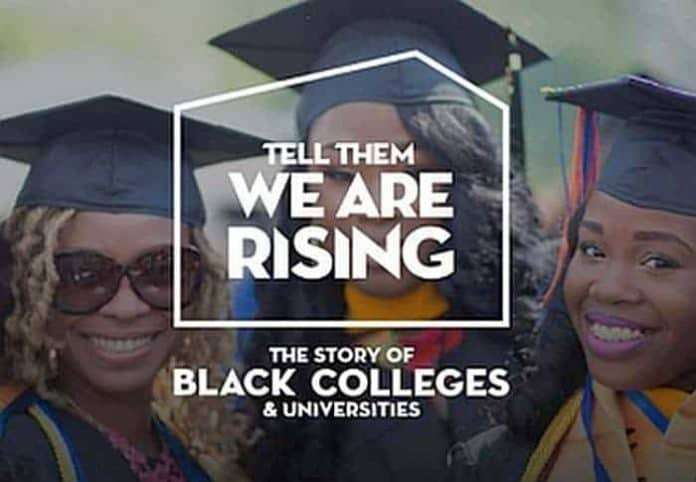A haven for Black intellectuals, artists and trailblazers—and path of promise toward the American dream—Black colleges and universities have educated the architects of freedom movements and cultivated leaders in every field. HBCUs are rising.
They have been unapologetically Black for more than 150 years. For the first time ever, their story is told. Written, directed and produced by award-winning documentary filmmaker Stanley Nelson (The Black Panthers: Vanguard of the Revolution) and produced by Firelight Films, Tell Them We Are Rising: The Story of Black Colleges and Universities examines the impact HBCUs have had on American history, culture, and national identity. Beginning with the earliest attempts at education to today’s campuses, the 90-minute film will air nationally on the acclaimed PBS series, Independent Lens, on Monday, February 19, 2018, 9pm – 10:30pm ET (Check local listings).
Tell Them We Are Rising: The Story of Black Colleges and Universities is the second in a three-part series called America Revisited that includes The Black Panthers: Vanguard of the Revolution, which was the most watched Independent Lens program ever, and the forthcoming, The Slave Trade: Creating A New World.
The film is the centerpiece of a yearlong multi-platform effort, HBCU Rising, featuring public and marquee VIP screenings in major cities across the country, StoryCorps audio stories, video shorts, an HBCU campus tour and an all-generation, all-school HBCU Digital Yearbook. National partnerships in support of the film include: The Black College Fund, Color of Change, the Association for the Study of African American Life and History (ASALH), Thurgood Marshall College Fund, National Pan-Hellenic Council (NPHC), Alpha Kappa Alpha Sorority, Inc., Akila Worksongs, Schomburg Center for the Research in Black Culture, United Negro College Fund, the NAACP Legal Defense Fund, Blackout for Human Rights, the HBCU Green Fund, MomsRising and Campaign for Black Male Achievement.
Nelson is renowned for examining the history and experiences of African Americans. His most notable films are The Black Panthers: Vanguard of the Revolution, Freedom Riders, Freedom Summer, Wounded Knee, Jonestown: The Life & Death of People’s Temple, and The Murder of Emmett Till. Tell Them We Are Rising premiered in January 2017 at the prestigious Sundance Film Festival, making it his ninth festival premiere, more than any other nonfiction filmmaker. With multiple industry awards, a National Humanities medal and a MacArthur “Genius” award to his credit, Nelson is acknowledged as one of the premier documentary filmmakers working today. His company, Firelight Media is a non-profit production company which provides technical education and professional support to emerging documentarians and expands the reach and impact of nonfiction film. http://firelightmedia.tv/
DIRECTOR’S STATEMENT My parents were the product of HBCUs. For generations, there was no other place our parents, grandparents, and great-grandparents could go to school. Yet, higher education has always been a prerequisite for entering and competing in mainstream American society. So, in many ways, historically black colleges and universities form the core of the African-American community. The sacrifices made to create these institutions are significant, and are what compelled me to capture this essential chapter of American history.
I set out to tell a story of Americans who refused to be denied a higher education and—in their resistance—created a set of institutions that would influence and shape the landscape of the country for centuries to come. In particular, it was essential that this film highlight authentic, personal accounts alongside archival footage, letters, diaries, photographs, and even home movies of the people who have lived the HBCU experience. The legacy of these institutions is not marked only by milestones and achievements; it is encapsulated by the minds and lives of the people who walked those storied halls.
If education is a cornerstone of society, then HBCUs are the groundwork for advancing justice in America. Thoroughly examining the history of HBCUs not only allowed me to highlight their importance within black communities, but demonstrate how they were instrumental to the formation of protest movements across the United States. The ground was ripe on these campuses.
There is a distinct reason, imbued by the institutional legacy of HBCUs, that the challenge to school segregation and the sit-in movement had to come out of Black schools. These were places where African-American students could, for once as the majority, talk about issues that affect the African-American community. That atmosphere is what I sought to capture in the film to give audiences a sense of the energy that emerged out of HBCUs.
It is impossible to capture the entire breadth of HBCU history in under two-hours. My hope is that the film reaffirms the indisputable relevance of HBCUs. With on-going campus racism and an increasingly hostile national climate for communities of color, the need for institutions that prioritize a quality educational, cultural, and social climate for black people is as important as ever.

